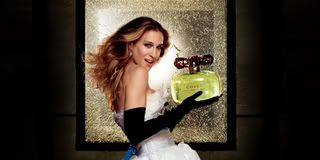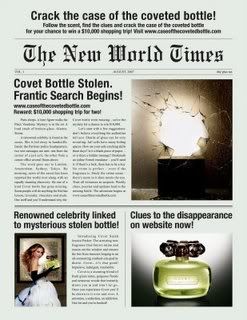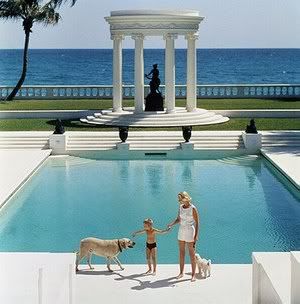
Perfume Shrine always aims to bring our readers the highlights of fragrance appreciation with objectivity and a level-headed analytical approach.
So, in the pursuit of those goals, we present you today with
an interview with one of the controversial players in fragrance writing:
the journalist and writer Chandler Burr.Mr.Burr perused our site, confessed being impressed with the quality (we humbly blushed) and honoured us with an in-depth interview on certain sensitive points that were rather tough, per his estimate: about his current position as perfume critic in
The New York Times, a position for which he has been criticized a lot by internet readering perfumephiles; his acquintance with Luca Turin for "The Emperor of Scent"; his stance on the matters of perfume composition; his newest book "The Perfect Scent" which follows the creation of two fragrances from scratch: one for a celebrity, Sarah Jessica Parker, and the other by esteemed perfumer Jean Claude Ellena for Hermès; and his views on the new luxe tendencies in the industry.
Perfume Shrine appreciates the thought and effort that went into answering those questions; we found him agreeable and we sincerely thank him.
Let's follow him.....
PLEASE NOTE: unauthorised copying of excerpts of the book constitutes copyright infringement. Mr.Burr personally gave us express permission to reprint those for this venue only.
PART 1
PS:
Chandler, you had been a journalist for a long time and had written a book on sexuality. How did you decide after writing “The Emperor of Scent” to devote more of your time into writing about perfume? Was it a new interest, a new field for journalistic exploration that culminated in your New York Times appointment or something that turned into a genuine and profound love for fragrance? CB: I actually had no intention of writing on perfume again. In fact, I didn’t really consider “The Emperor of Scent” a book related to perfume as a subject per se, although I of course now realize that was obtuse on my part. I’d loved writing about perfume in the context of “Emperor,” discovering scent criticism via Luca Turin’s writing, hearing his astonishing stories about perfume and his opinions—learning the basics of what “good” and “bad” meant in this brand new (to me) artistic field.
“The Perfect Scent” and my position as The New York Times perfume critic were entirely a surprise and entirely the result of an idea pitched to me by my editor at The New Yorker magazine. He took me to lunch, and I proposed ten—I remember the number; I’d prepared a list—detailed pieces that interested me, basically economics stories in Asia. That’s my field, at least officially; I studied international relations in Paris, Chinese history in Beijing, and I started as a stringer at the Christian Science Monitor's Southeast Asia bureau in Manila. My Masters is Japanese political economy. But he said to me, well, I read “Emperor,“ and what really interested me are these people, these perfumers, who make perfume. He’d had no idea the profession existed. He proposed that I do a behind-the-scenes account of the creation of a perfume. I absolutely didn’t want to do it. I didn’t tell him that, of course. Well, I think I cringed a little. The reason is that I really, really wanted to start reporting from Asia and I really, really didn’t want to have anything to do with fashion. It’s a world I dislike, one I feel quite uncomfortable in. Or felt. I’m a bit more used to it, but the point is, it’s just not my thing—I knew how to write about the automotive industry in Japan, but I had no idea how to write about perfume and fashion, I’d never done it before, “Emperor” sure as hell wasn’t about that—and because of that discomfort I actually wound up turning in a first draft to The New Yorker that they hated, which I didn’t know until after the piece was published. We edited it down, found the narrative, and I discovered that I loved writing about perfume as perfume. Writing “Emperor” I smelled almost nothing. Writing the New Yorker piece and then “The Perfect Scent” I smelled raw materials and perfumes constantly, every day, spent weeks and weeks in laboratories, visited raw materials plants, fields that grew orange blossoms and roses and jasmine. Amazing.
When the New Yorker piece came out, I was at a party at Hermès on Madison Avenue, and Francesca Leoni introduced me to Stefano Tonchi, the head of T Style, the New York Times style magazine. He said, “Come see me Friday at 10!” I showed up at The Times—I hadn’t confirmed, I just showed up at 10—and he was surprised to see me—“But you didn’t confirm!” (Sorry)—but we sat down, and he said, “We want you to write for us! What would you like to do?” I said, “I’d like to be your perfume critic.” He stared at me for a moment and then said, “I love it! We’ll do it!”
PS:
Most people involved in perfume know you from “The Emperor of Scent” and its unraveling of the Luca Turin saga. How was it meeting him and knowing him as a man? There are some hints in the book, but fans are interested in more. CB: I had never spent time with an actual genius before, and it is a profoundly strange sensation. Here is a mind that is simply running at such a high processor speed, with such a large memory and a vastness of information available to it, and I just reveled in it. What’s interesting to me is the range of reaction to Luca as I presented him in “Emperor.” Some people hated the character as they interpreted him in my book, found him arrogant, egotistical—which in my opinion he is not at all; having opinions is not the same thing as being egotistical. Others loved him. “He’s touchy, he’s fun, he’s grouchy, he’s brilliant, he’s self-destructive”—I’ve heard everything from readers of the book.
It seems obvious to me that we exist, as people, in the number of parallel universes that there are people who know us; if five people know you, you are five different people. Luca is certainly touchy, fun—to me, wildly fun, I’ve never been able to have the conversations with people that I have with him—self-destructive, brilliant, entertaining, enlightening. He is also absolutely imperfect; being a genius doesn’t remove flaws, in fact it amplifies them. He can be solipsistic—the breakdown of intelligence—petulant, violent. I’ve been furious at things he’s said and done and vice versa. He’s stopped speaking to me numerous times. In the periods in which we’re on good terms I never, ever have better political conversations, more interesting talks, or a better time with anyone. He is eminently practical (there is no higher word of praise in my vocabulary, just so you know), concise, and, as Luca loves to say, bullshit-free. He can be more reactive and juvenile, more clear minded and perceptive—astonishingly, effortlessly so—than anyone I’ve ever met. He is extra ordinary {sic}. And there it is.
PS:
You have been the perfume critic of the New York Times for quite some time now. There has been some criticism about your columns from people who are interested in perfume, especially on internet fora. This is a good thing, because it means that so many read you and pay attention, by the way! The main complaint however has been that you became a perfume critic by association: because you had met someone who had been a perfume critic himself. Other complaints focus on your prose or your attention to the chemical structure of things which they might deem as unromantic. How would you reply to them, if at all? CB: OK, so let’s take them one by one. Obviously I became a perfume critic by association: I met Luca, I learned from him that perfume criticism existed, I wrote about him doing it, then I started doing it. And? How do they think people become anything? David Geffen started working in the William Morris mailroom. Amy Pascal started as some producer’s assistant; now she’s Chairman of Sony Pictures Entertainment Motion Picture Group. In fact, throughout history a vast number of the men and women who’ve made it to the top of their professions started on the lowliest levels in places they got to by pure chance—life is like that—and rose. Joseph Volpe began as a carpenter's apprentice at New York's Metropolitan Opera and four decades later became its general manager. And on and on and on. This is an idiotic observation to make about me on its face.
But if they are actually arguing, elliptically, that my criticism is qualitatively inferior, that’s a completely different and unrelated argument. And they can make that argument. But they should make that argument directly. The other is an observation, not an argument, and it is prima facia moronic. So is my criticism qualitatively inferior? I hope not. I certainly spend an immense amount of time and effort trying to insure it isn’t.
Complaints about my prose and my attention to the chemical structure of things: These are of course perfectly legitimate points. My response is, first, that nobody bats a thousand, and I sure as hell am no exception. I make mistakes (in retrospect, obviously; one only has retrospect to make that call) all the time in choice of adjectives and so on. If you write for a year, you have a year’s worth of writing to find things that you regret. If you write for 30 years, you’ve got 30 years’ worth. Somebody once asked Frank Bruni how often he read what was on the blogs about him, and he said, emphatically, “Never!” My answer is: “Almost never.” First, I’m not a board guy, either technically (I lose my way on them) or temperamentally. Second, the ratio of serious, intelligent criticism of my own writing, both positive and negative, that I’ve seen is relatively small. When it’s there, I love it. A friend sent me to look at something on Perfume of Life recently, and I found an entire thread in which people had not only posed several smart criticisms of me but asked several pertinent questions, and I wound up making the first board entry I think I’ve ever made. I really enjoyed it. I have no time or interest in comments like “Burr is such an asshole,” “What a jerk,” “Yeah, anyone else who can’t stand him?” There is simply zero content here. When the comments are intelligent and thoughtful, then I’m interested.

For example, there’s the criticism of my writing about the molecules and synthetics and the opinion that that makes perfume “unromantic.” I could not possibly disagree more strongly with this point of view, but it’s an entirely legitimate point of view, so to give an answer: For me—not for others, I realize; I’m speaking from my perspective—good criticism decorticates and reverse engineers the art it is examining on a mechanical level as well as a conceptual/ aesthetic one. I used the example once of Alex Ross, the New Yorker’s classical music critic, who will, rarely but sometimes, give specifics about the keys, modalities, and technical details of the music he is criticizing. I wish he did it more. I love it. I’ve read critics who talk about the technical aspects of perspective in painting and the electronics and physics of the machines that reproduce the Ravel that we listen to. I love that. (Luca is actually an expert in this.) So I start from that perspective.
Now, to bring that specifically to perfume: In "The Perfect Scent", this is part of what I say.
"I was at breakfast in Paris at one of the stupidly expensive Alain Ducasse places with the creative director of a prominent French house. I told her about a piece I was writing about synthetics for The Times, explaining the role that synthetics had in perfume and that most perfumes are made of synthetics today. She looked at me with honest horror. She said, “Mais Chandler, tu casses le rêve!” But, Chandler, you’re destroying the dream! The dream being some information-free version of perfume where the stuff presumably flows purely outof a tiny magic spigot attached to a rosebush or something else and is bottled by fairies with LVMH employment contracts. I like this woman. She’s serious and smart, but she shares this viewpoint with the overwhelming majority of French perfume industry people (and basically the same number of their New York counterparts), and I couldn’t disagree with them more. When I repeated the comment to Frédéric Malle, he rolled his eyes and said, “They’re killing themselves with this rêve, which in my opinion is more of a cauchmare.” A nightmare.
For example: Not only are synthetics fascinating; they’re basically completely misunderstood by everyone. Including some of the pros, by the way…..Perfume is a parade of emperor’s new clothes. In the “dream” version of perfume, marketers tell the public that perfumes have “notes of caramel and blueberry,” which simply means, since there are no natural caramel or blueberry perfumery raw materials (it’s neither technically possible nor financially viable to distill them), that the perfumers have just created these scents (perfumers call them accords, not notes, which is a term for public consumption).
You can create the scent of caramel with 3-hydroxy-4,5-dimethyl-2(5H)-furanone. If you take that molecule and add a small amount of ethyl butyrate, ethyl valerate, and phenethyl acetate, you get a nice fresh garden berry that would work great in an Escada launch. God forbid the public knew it.
Explaining a jet engine or the wing of a 787 doesn’t destroy the awesome beauty of flight. It doesn’t break the dream. It does the opposite. The more you understand of science, the more you marvel at the magic of reality, and creating the dream is not the same as perpetuating ignorance. It is the opposite: taking people inside, letting them see behind the scenes, showing them how it all works. To the degree to which its public discourse aligns with the truth about the construction of its perfumes, Estée Lauder is always on surer, safer, more solid ground. This is, pretty much, the fundamental political observation of the twentieth century; it is one of the more obvious economic lessons drawn from ideological, antimarket socialist economies where both economic forces and the public relations surrounding them were divorced from the reality of consumer instincts. Lauder’s old public relations policy, in which the perfumer was never to be mentioned and Mrs. Lauder was presented in some vague, inchoate way as sitting in her kitchen pouring raspberry ketone into dihydrojasmonate, is from a different era.
The paradigm is antiquated. I would suggest that it is also commercially ineffective. In fact, probably counterproductive…. Millions are fascinated by the process by which designers like Todd Oldham cut, sew, design, and agonize their fall collections into existence, but the great creative minds at Yves Saint Laurent and Jean Paul Gaultier and Dior, with the collective brilliance of a single mollusk at low tide, have intuited that with perfume? No. Here is an industry suffocating itself on the most immense pile of public relations human civilization has ever produced, a literal mountain of verbiage about “the noble materials, symbol of eternal feminine beauty, addictive notes of Cocoa Puffs, she can’t wait to taste him like a Hershey’s kiss, Cleopatra wore this, it has notes of distilled wild all-natural Martian fungus harvested by French virgins on the third moon of Pluto.” The lies pile up on other lies, they generate a poisoned river of vapid crap the marketers try to pass off as “information,” and the brands have no clue that their public relations approach is about fifty years out of date. Reading anything they put out on their perfumes is like reading a combination of Kafka, only less creative, and Pravda circa 1985. Zero interest. There is almost no recognition that the enforced lack of knowledge, this gaping void of nothingness about what their products actually are, who makes them, and what’s in the things, is creating boredom and disinterest. The perfume industry is choking itself to death on its vacuum."
~
The Perfect ScentPS:
On the matter of synthetics, there has been polemics of sorts between people who defend naturals (scents made out of naturally-derived raw materials, that is) and those who prefer synthetics (scents with a preponderance of man-made aroma chemicals). Your own stance so far shows a very distinct tendency towards the latter. Would you mind explaining how and why this came about? Some might say that you are not all that familiar with all-naturals scents anyway.
CB: “Some might say that you are not all that familiar with all-naturals scents anyway.” I may of course be wrong, but I believe I’m more than familiar enough with all-natural scents. I have smelled many of them, in several different collections, over the years. Most lately a new batch, two weeks ago, in a restaurant in Soho. They are natural perfumes, which is to say they have an extremely limited palette, range, and technical performance. They are boring, and my position—which is that synthetics are absolutely just as integral to and legitimate in perfumery as natural materials; not that they are better but simply that they are equal—comes from the simple empirical observation that all raw materials are made up of chemicals. It is utterly illogical to argue that a chemical made in a plant is superior (or inferior for that matter) to the same chemical made in a factory. It’s simply illogical. It is illogical to argue that natural molecules are all good and synthetics all bad when arsenic is natural and it is a poison (as are so many other naturals). It is simply illogical. But religious people are not logical, and the all-natural people are deeply, fervently religious, and I have no more to say to them than I do to any other theocratic fundamentalists. If naturals are simply spiritually better, then my empirical position is worthless and I am wrong by definition. That’s the way religious truth works. In my view, however, religious fanaticism sucks, and it is no more logical to build a perfume today only of natural materials than it is to build a building today only out of mud, wood, and thatch.
PS:
Today’s mainstream perfumery has been “cheapened” by popular agreement. Is this due in part to fragrance houses briefing the big companies that produce scents to use the cheapest ingredients, some of which are indeed aroma chemicals that mimic natural essences that have a prohibitive cost or is it merely the ugly head of unrestrained capitalism raising itself?
CB: Yes.
PS:
Additionally, today’s mainstream perfumery lacks originality: everyone is copying each other and the latest blockbuster in this tsunami of perfume releases. How did it come to that? Is there a way out? Many perfumers have admittedly become jaded, like Pierre Bourdon for instance. CB: It came to that in exactly the same way that it came to the exact same thing in Hollywood: I once heard an MBA say to me, rather wearily, “The fundamental principle in business is: reduce risk.” Olivier Cresp did
Light Blue for Dolce & Gabbana, and it is just wonderful and delightful, an innovative way of doing clarity as an aesthetic. Then he did
Black XS, which was the same theme, and it was slightly less interesting, though still good. Then he did
Ange ou Démon, and it was what it was: a copy of a copy. But what is Olivier to do? He’s done this hugely successful thing (that also happens to be very good), they ask him, “Hey, can you make us a
Light Blue too?” They mean, usually, in sales figures, but sometimes they just say it: “Copy that!” What is he to do?
YOU CAN READ THE 2nd PART CLICKING HERE
Pic of firing men from the film
The wind that shakes the barley courtesy of athinorama. Pic of
tryptophan structure from linkinghub.elsevier

.jpg)
.jpg)
.jpg)
.jpg)




 Sarah Jessica Parker impressed us with her Lovely musky foray into fragrance as we didn't really expect a celebrity perfume to be of any considerable substance. But this was a serious perfume lover we were talking about (
Sarah Jessica Parker impressed us with her Lovely musky foray into fragrance as we didn't really expect a celebrity perfume to be of any considerable substance. But this was a serious perfume lover we were talking about (





